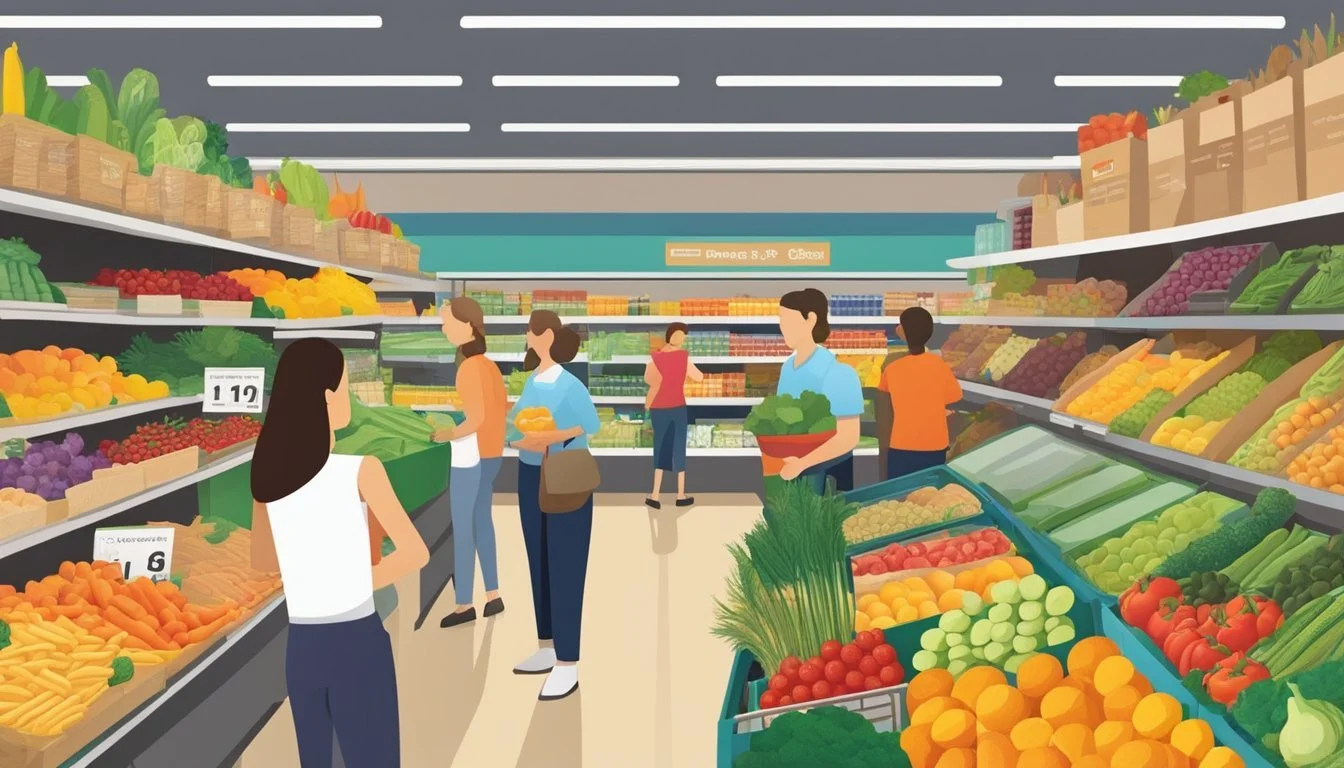Fresh Finds: Uncovering the Best Grocery Stores for Unprocessed Foods
When it comes to shopping for unprocessed foods, certain grocery stores stand out from the rest. These retailers prioritize fresh, whole ingredients and offer extensive selections of organic produce, minimally processed meats, and natural pantry staples. The best grocery stores for unprocessed foods include Whole Foods Market, Sprouts Farmers Market, and local co-ops or farmers markets.
These stores typically feature well-stocked produce sections with a wide variety of organic fruits and vegetables. They also tend to have robust bulk food departments, allowing customers to purchase nuts, grains, and legumes without excess packaging. Many of these health-focused grocers also carry grass-fed meats, wild-caught seafood, and dairy products from pasture-raised animals.
While shopping at these specialty stores can sometimes come with a higher price tag, the quality and variety of unprocessed options often justify the cost for health-conscious consumers. Some conventional supermarket chains have also expanded their natural and organic offerings in recent years, providing more accessible options for those seeking whole, unprocessed foods.
Understanding Unprocessed Foods
Unprocessed foods form the foundation of a healthy diet. These nutrient-dense options provide essential vitamins, minerals, and other beneficial compounds in their natural state.
What Constitutes Unprocessed Food?
Unprocessed foods are those that remain in their natural state or have undergone minimal alteration. Fruits and vegetables picked fresh from the farm or garden are prime examples. Whole grains like brown rice and quinoa also fall into this category.
Meats, poultry, and fish that haven't been cured, smoked, or had preservatives added are considered unprocessed. Eggs, milk, and plain yogurt represent unprocessed dairy options. Legumes, nuts, and seeds in their raw or roasted forms without added oils or salt are unprocessed as well.
These foods retain their original nutritional profile and don't contain artificial additives, preservatives, or excess sugar and salt.
Health Benefits of Unprocessed Foods
Consuming unprocessed foods offers numerous health advantages. These foods are typically rich in fiber, vitamins, minerals, and antioxidants. They help maintain stable blood sugar levels and promote better digestion.
Unprocessed foods support heart health by providing healthy fats and reducing intake of harmful trans fats. They aid in weight management due to their high nutrient density and lower calorie content compared to processed alternatives.
A diet based on unprocessed foods may lower the risk of chronic diseases like diabetes, obesity, and certain cancers. It can also boost energy levels and improve overall well-being.
Identifying Unprocessed Foods in Grocery Stores
When shopping for unprocessed foods, focus on the store's perimeter. The produce section offers a wide variety of fresh fruits and vegetables. Look for items without added sauces or seasonings.
In the meat department, choose plain cuts of beef, pork, chicken, or fish. Avoid pre-marinated or seasoned options. The dairy section provides milk, plain yogurt, and eggs.
Whole grains can be found in the bulk section or with packaged goods. Choose items with single-ingredient lists like "100% whole wheat flour" or "rolled oats."
Check labels carefully. Unprocessed foods should have no added sugars, preservatives, or artificial ingredients. Opt for products with short, recognizable ingredient lists.
Evaluating Grocery Stores for Unprocessed Food Options
Selecting the right grocery store is crucial for maintaining a diet rich in unprocessed foods. The availability, quality, and variety of whole foods can vary significantly between different retailers.
Criteria for Selecting the Best Stores
When evaluating grocery stores for unprocessed food options, consider the following criteria:
Produce section size and quality
Availability of organic and local fruits and vegetables
Bulk bin offerings for grains, nuts, and legumes
Fresh meat and seafood counter with minimal processing
Dairy section with minimally processed options
Look for stores that prioritize whole foods and offer a wide selection of fresh ingredients. Stores with in-house butchers and seafood counters often provide less processed meat options.
Comparing Popular Grocery Chains
Trader Joe's stands out for its affordable organic produce and unique unprocessed snack options. The chain focuses on private-label products, many of which are minimally processed.
Costco, despite its bulk-buying model, offers a surprising array of organic and unprocessed foods. Their large produce section and high-quality meat options make it a solid choice for health-conscious shoppers.
Aldi has been expanding its organic and natural food offerings. While their selection may be more limited, they often provide unprocessed options at competitive prices.
Benefiting from Local Farmers Markets
Farmers markets are excellent sources of unprocessed foods. They offer:
Fresh, seasonal produce directly from local farms
Organic fruits and vegetables at competitive prices
Artisanal breads and baked goods made with whole ingredients
Farm-fresh eggs and dairy products
Locally raised, minimally processed meats
Shopping at farmers markets supports local agriculture and provides access to some of the freshest, least processed foods available. Many markets also offer educational resources on preparing whole foods.
Shopping Strategies for Unprocessed Foods
Effective shopping strategies are crucial for maintaining an unprocessed diet. Careful planning and informed choices at the grocery store can make a significant difference in the quality of food consumed.
Making a Healthy Grocery List
A well-prepared grocery list is essential for successful unprocessed shopping. Start by planning meals for the week ahead. Focus on fresh produce, whole grains, and lean proteins. Include a variety of colorful fruits and vegetables to ensure a wide range of nutrients.
Make a list of pantry staples like olive oil, nuts, and dried herbs. Include dairy products such as plain yogurt and milk if desired. Avoid items with added sugars or artificial ingredients.
Keep the list organized by store sections: produce, meats, dairy, and dry goods. This approach streamlines the shopping process and reduces impulse purchases of processed foods.
Seasonal Shopping for Freshness
Buying seasonal produce offers multiple benefits. Seasonal fruits and vegetables are often fresher, more flavorful, and less expensive. They also tend to have higher nutritional value.
Check local farmers' markets for the best seasonal offerings. Many grocery stores also highlight seasonal produce. Spring might feature asparagus and strawberries, while autumn brings apples and squash.
Seasonal shopping supports local farmers and reduces the environmental impact of long-distance transport. It also adds variety to meals throughout the year.
Decoding Labels and Health Claims
Understanding food labels is crucial for avoiding processed foods. Look for products with short ingredient lists featuring recognizable items. Avoid foods with artificial preservatives, colors, or flavors.
Be wary of health claims on packaging. Terms like "natural" or "healthy" are not strictly regulated. Instead, focus on the ingredient list and nutrition facts panel.
For packaged foods, choose items with minimal processing. Whole grain bread should list whole wheat flour as the first ingredient. Avoid products with added sugars, which may be listed under various names.
Integrating Unprocessed Foods into Your Diet
Incorporating whole, unprocessed foods into your daily meals can be simple and delicious. By focusing on fresh ingredients and basic cooking techniques, you can create nourishing meals that support your health goals.
Simple Recipes with Whole Ingredients
Start with easy recipes that use minimal ingredients. A vegetable stir-fry with brown rice takes just minutes to prepare. Simply chop your favorite veggies, sauté them in a pan with olive oil, and serve over cooked brown rice.
For breakfast, try overnight oats. Combine rolled oats with milk or yogurt, add fresh berries, and let it sit in the fridge overnight. In the morning, you'll have a nutritious meal ready to eat.
Grilled chicken with roasted vegetables makes a quick and healthy dinner. Season chicken breasts with herbs, grill, and pair with oven-roasted carrots, broccoli, and sweet potatoes.
Meal Planning with Unprocessed Foods
Plan your meals for the week to ensure you have the right ingredients on hand. Start by selecting recipes that use whole foods as the base. Create a shopping list focused on fresh produce, lean proteins, whole grains, and healthy fats.
Prep ingredients in advance to save time during busy weekdays. Wash and chop vegetables, cook grains, and portion out proteins for easy assembly later.
Consider batch cooking staples like quinoa or roasted vegetables. These can be used in multiple meals throughout the week, saving time and effort.
Substituting Processed Items
Replace processed snacks with whole food alternatives. Instead of chips, try raw vegetables with hummus or homemade guacamole. Swap out sugary cereals for plain oatmeal topped with fresh fruit and a drizzle of honey.
Use whole grain bread instead of white bread for sandwiches. Opt for plain Greek yogurt with fresh berries rather than flavored yogurts high in added sugars.
Make your own salad dressings using olive oil, vinegar, and herbs to avoid the additives in store-bought versions. Replace soda with sparkling water infused with fresh fruit slices for a refreshing, sugar-free drink.
Understanding Food Labels and Packaging
Food labels and packaging provide crucial information to help consumers make informed choices. Knowing how to interpret nutritional facts and identify hidden ingredients empowers shoppers to select healthier, less processed options.
Interpreting Nutritional Information
The Nutrition Facts panel lists key nutrients per serving. Calories, fat, carbohydrates, protein, fiber, and sodium are displayed prominently. Look for products with lower amounts of saturated fat, added sugars, and sodium. Compare labels to find options with more fiber and protein. Pay attention to serving sizes, as they may differ from what you actually consume.
Ingredients are listed in descending order by weight. Choose products with simple, recognizable ingredients. Whole foods like fruits, vegetables, and grains should appear first. Be wary of long lists with chemical-sounding names.
Uncovering Hidden Additives and Sugars
Manufacturers often disguise less desirable ingredients. Sugar may appear as corn syrup, dextrose, or maltose. Sodium hides in terms like monosodium glutamate or disodium phosphate. Look for "partially hydrogenated oils" to spot trans fats.
"Organic" labels indicate foods grown without synthetic pesticides or fertilizers. However, organic processed foods can still contain added sugars and oils. "Natural" has no regulated definition and doesn't guarantee healthfulness.
Claims like "low-fat" or "reduced sodium" can be misleading. These products may contain added sugars or other additives to improve taste. Always check the full ingredient list and nutritional panel for a complete picture.
Health Considerations and Nutritional Benefits
Unprocessed foods offer numerous health advantages and nutritional benefits. They provide essential nutrients while minimizing potential risks associated with heavily processed options.
Vitamins, Minerals, and Other Nutrients
Unprocessed foods are rich in vitamins and minerals crucial for optimal health. Fresh fruits and vegetables contain high levels of vitamin C, potassium, and folate. Whole grains provide B vitamins and fiber.
Lean meats and fish offer protein, iron, and omega-3 fatty acids. Nuts and seeds are excellent sources of vitamin E and healthy fats.
These foods are typically lower in added sugars and sodium compared to their processed counterparts. They also retain more natural fiber, which aids digestion and promotes feelings of fullness.
Environmental and Ethical Benefits
Choosing unprocessed foods can have positive environmental impacts. These products often require less packaging, reducing waste and plastic pollution.
Many unprocessed foods are sourced locally, decreasing transportation emissions. Organic options minimize pesticide use, benefiting soil health and biodiversity.
Purchasing from local farmers' markets supports small-scale agriculture and promotes sustainable farming practices. This approach can also ensure fairer wages for farm workers.
Avoiding Risks Associated with Processed Foods
Unprocessed foods help reduce exposure to potentially harmful additives and preservatives. They contain fewer artificial colors, flavors, and sweeteners linked to health concerns.
Consuming whole foods lowers the intake of refined carbohydrates and unhealthy fats often found in processed items. This can decrease the risk of obesity, heart disease, and type 2 diabetes.
Unprocessed diets may also reduce exposure to certain chemicals used in food packaging, such as bisphenol A (BPA). These substances have been associated with hormonal disruptions and other health issues.
Alternative Diets and Unprocessed Food Varieties
Unprocessed foods form the foundation of many alternative diets. These whole ingredients cater to various dietary needs and preferences, offering nutritious options for those seeking to avoid highly processed products.
Unprocessed Foods in Plant-Based Diets
Vegan and vegetarian diets rely heavily on unprocessed plant-based foods. Fresh fruits and vegetables are staples, providing essential vitamins and minerals. Whole grains like quinoa, brown rice, and oats offer complex carbohydrates and fiber. Legumes such as lentils, chickpeas, and black beans serve as protein sources.
Nuts and seeds provide healthy fats and additional protein. Tofu and tempeh, made from soybeans, are minimally processed protein options. Plant-based milk alternatives like almond or oat milk can be found in less processed forms without added sugars or stabilizers.
Options for Gluten and Dairy Sensitivities
Gluten-free diets can incorporate a variety of unprocessed foods. Rice, corn, and potatoes are naturally gluten-free starches. Gluten-free grains like millet, buckwheat, and sorghum offer nutritious alternatives. Fresh meats, fish, eggs, fruits, and vegetables are all naturally gluten-free.
For dairy-free diets, coconut milk and nut-based yogurts provide creamy textures without dairy. Nutritional yeast offers a cheesy flavor for those avoiding dairy products. Paleo and keto diets often emphasize unprocessed meats, fish, eggs, and low-carb vegetables, aligning well with dairy-free options.







